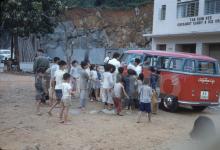"Riding to hounds at Fanling"
Primary tabs
Could anyone point me towards accounts of hunting in Hong Kong? I noticed in Peter Hall's book "In the Web" that one of his relatives "rode to hounds at Fanling". I'd be interested to find out if many women hunted. My aunt, Evelyn Warren, was a keen horsewoman and persuaded her father, Charles Warren, to go in for buying race horses when she returned to Hong Kong from her English boarding school in 1919 . Evelyn rode with a hunt in England and would have continued in Hong Kong if she could. There was latterly stabling for four horses at Charles Warren's house, The Towers, 20 Broadwood Road - probably not all racing ponies. Are there foxes in Hong Kong, or was some other animal hunted?
Jill


Riding to Hounds at Fanling
Hello Jill
If you refer to my photo uploaded some time ago (look in the Images Gallery - scroll to 1930s-1950s Brooks family photos and klik "apply") - its titled Hong Kong Riding Club c1937 - where I mention that my father Ron Brooks used to ride in the gymkana and enjoy the "hunt" - including my mother Helene. So, yes they definitely did have that activity - but what they used as the victim I don't know - I don't think they had foxes. The Riding Club (which they often referred to as 'the Jockey club") was a big part of their lives.
In the photo I was asking if anyone knew where it was taken - no one has as yet come up with a definite answer - other than the suggestion that it is Fanling. - but I'm not so sure about that.
Suziepie
Fanling Hunt
Thanks, Susiepie for guiding me to your family photos and to previous threads about the hunt. I notice that Moddsey has posted an excerpt from the HK Daily Telegraph, 22 December 1925, which surely must be one of many in the local papers:
'Next the hunt picked up a good scent at the back of Cheery 'Ole and leaving the Portuguese Golf Club on the right made a bee-line for the hills". - a scent of what though?
Pointers to any fuller accounts of the Fanling Hunt's exploits in the 1920's welcome. I've found the article posted about Lady Chater's donation of hounds and the Hunt's finances.
Jill
Fanling Hunt
Jill
There is quite a bit on the Fanling Hunt by searching on the old Gwulo site using "Fanling Hunt" or "Kwanti Racecourse."
From recollection it was drag hunting ie following a scent dragged by a huntsman through the countryside for the riders to track and hopefully follow. Also searches on "The Huntman's Arms," a pub not a person ! and "The Better Ole" another pub in the locality may add more.
Victoria Riding School - Kowloon
My stepfather owned the Victoria Riding School in Kowloon - this was in the early 1930s. He used to buy "retired" horses from the Jockey Club in Happy Valley. I am still searching for some pictures I have seen in family archives. I don't think the school was in operation for long because my stepfather died from a fall, and the school was subsequently closed. Horses also used to be available for hire. I was aged about 5- 6 years at the time (I have photos of me on one of the horses which I will post later), but I do remember that groups would go out somewhere in the Kowloon Hills (?) and hunt for wild pigs. Perhaps this was also the game in Fanling in those "wild and woolly" days?
Hunting in Hong Kong
There were foxes in all parts of Hong Kong up until about the 1950s, tigers and leopards until about the same time hunted by shooting parties who sometimes ignored the pre 1997 border with China.Even turtles were hunted and if big ones were found they were eaten at big feasts in hotels
Try searching under the word
Try searching under the word hunt using the Hong Kong newspaper archive via Wikipedia online newspapers archive
Fanling hunt
Thank you, everybody. Interesting to know that 'retired' racing ponies were used for hunting. That could have been quite exciting. Were they trained to jump, I wonder. Also if wild pig were hunted, perhaps boarhounds were used rather than fox hounds. I certainly didn't know that foxes existed in Hong Kong. I'm sure IDJ is right that drag hunting must have been an alternative - especially in later years. I shall see what I can turn up in the old newspapers. There must be some dramatic stories.
Jill